- Home
- Laura Purcell
The Corset Page 2
The Corset Read online
Page 2
‘Sewing is not dangerous. There is a small risk, I grant you, with needles and pins but they are careful. They always have an attendant to supervise. You cannot really hurt someone with a needle, Ruth.’
She cocked her dark head. I felt gooseflesh, skittering over my skin.
‘Can’t I?’
2
Ruth
If I’d been born a boy, it never would have happened. I never would have picked up a needle, never known the power I possessed, and my life would’ve gone down some other path. I might have been able to make my way in the world, to defend my mother. But instead I shared the fate of all girls who are poor of pocket: I was tied to my work, like a needle tethered by thread.
You can live your life through a piece of sewing; that’s what people don’t realise. You can ply your needle with any emotion in the human heart and the thread will absorb it. You can sew with tenderness, you can stitch yourself from panic to calm, you can sew with hate. Sewing in a fury never got me anything except tangled skeins and botched seams, but you can do it. Better to wait for hate. A slow, measured hate. No one can tell it’s there, simmering in your fingertips, except for you and the needle.
People say hate is a wasted emotion, a destructive force you can do nothing useful with. They’re wrong. I’ve gripped rage, I’ve wielded it like a weapon. But look at your face, miss. You’ve never hated one of your fellow creatures, have you?
It takes someone special to make you feel it for the first time. A person you would love, if they’d only let you. But their scorn shrivels you up, like a crape gown in the rain. They show you an image of yourself, and it’s weak and loathsome, even to your own eyes. Yes, it takes someone with a peculiar talent for cruelty to make you hate them like that.
Someone like Rosalind Oldacre.
She was a doll of a girl. Long, blonde curls. When she walked, it was with poise, a maturity far beyond the rest of us. Of course the teachers adored her. I could tell you about many things she did to me, that year when I was twelve, at Mrs Howlett’s finishing school. But there was only one that really mattered.
It happened on an afternoon in early autumn, when the days began to close in. The school bell rang and we all poured out into crisp, cool air. Already the moon bobbed above waves of grey cloud. Braziers burnt in the square. I scurried across the cobbles, watching the other girls peel off into the side streets.
Going home ought to be the best part of the day, but for me it was a time of heightened awareness, where every sound and sudden movement made me jump. It was the time I needed to run.
There was a passageway opposite the school, at the other end of the square. If I could make it through that quickly, I’d be safe for the rest of the evening.
Sometimes I was fast enough.
Not that day.
That day Rosalind was already there, lurking in the shadows that filled the passage. I stumbled to a halt beside a brazier as I caught sight of her. A bonnet concealed her blonde curls. Beneath it her expression was stiff.
‘Butterham.’ I’d always liked my name before, but now it sounded shameful, inappropriate on her rosehip lips.
Other girls trailed at her heels, their faces turned into a confusion of shades and hollows by the flames in the brazier.
‘Let me pass,’ I begged.
‘You’re poor, Butterham. You were made to take orders, not give them to your betters.’ The dusk heightened her looks but it was a terrible beauty, a frightful one.
‘Let me pass!’
‘I do not see how I am stopping you.’
Her slender frame didn’t fill the passageway. I might slip past her, but there were others behind, their eyes shining in the gloaming like rodents’ do. A gauntlet of girls. Dare I run it?
I launched myself forwards and tried to shove through but Rosalind caught me, her fingers sharp at my waist. ‘Not fast enough, not strong enough! I would not employ you. How ever will you earn your bread?’
Girls massed around me, penned me in. Something hit my nose and pain fizzed to the back of my throat.
Rosalind was right: I wasn’t strong, then. I couldn’t push my gabbling words through my lips, let alone break free from her grip.
Hands scuffed at my bodice. Material ripped. ‘You are not a lady, you shouldn’t be wearing these clothes! You belong in the gutter, Butterham. You’re a rat, a beast!’
They hooted. Cold air rushed inside my smock as they exposed my corset, my shift.
‘Look at this,’ Rosalind laughed to a girl behind her. ‘Tight lacing. She’s trying to be fashionable! You’ll never get a good silhouette, Butterham. Not with these corset bones.’ Her fingers nipped at my waist, tight, tight. ‘Cheap. What are they, cane? Goose-quill?’
I screwed up my courage and spat in her face.
All at once, she dropped me. My cheek hit the cobbles with a crack. Before I could gather my wits, her black, pointed boot flew towards me. Pain exploded in my ribs.
‘You see? They are really very weak supports.’ The girls gathered about her, each a malicious shadow. Row upon row of dark feet. ‘Cane bones are useless in a corset. How long will it take for them to break?’
It took longer than you’d think.
The streets were winding down for the evening by the time I dragged myself up and back towards home. Gone were the milkmaids and the fruit mongers; in their place lay orange peel and heaps of manure. No running boys, no clattering wheels. Only the sellers of second-hand clothes shambled by, and the pie man – I couldn’t see him but I smelt him, rich and meaty through the coal smoke.
The refuse of market day lay on the cobbles and I, the refuse of all things, walked over it. Hateful, unwanted. My feet pattered across puddles, around horse dung, and every step was agony. A cold, fearful sweat had coated me from head to foot, leaving salt crystals to rub raw beneath my shift.
I had a cloak – too short for me, but still serviceable – which I used to cover my bodice. I didn’t want Ma to see the footprints and the rips. Even so, I couldn’t conceal my limp. I couldn’t control the sharp intake of breath every time a snapped corset bone poked into my skin. As for my bonnet, I dragged it behind me on its broken ties.
If I didn’t get inside the house and upstairs without being seen, I’d have to tell my parents everything. That would be more painful than another beating.
Our house was modest, hunching in a terrace of identical siblings near the river. Three rooms up, two down, and an ash privy behind. Many had it worse. When I pushed open the battered, unvarnished door and stepped inside, the air was clean, if chill. Ma sat in the window, syphoning the last rays of the sun.
My ma was always marooned in a sea of material: cheap linen, cambric, wads of muslin. Sometimes I fancied it sucked the colour from her, leaving another grey streak in the black hair, another cloud in the blue eyes.
I crept towards the stairs.
She didn’t hear me come in. Her focus on the eye of her needle was complete. I watched her lick the thread and slot it through the tiny hole in one smooth motion.
My foot creaked on the bottom step.
Ma jumped. ‘Ruth?’ Rising stiffly to her feet, she stared across the white expanse of cotton separating us. ‘Whatever happened to your bonnet?’
Was it too late to run? I took another step up, but she was already fussing about the linen, pushing aside piles to make her way over to me.
‘Nothing, nothing happened,’ I said hurriedly.
‘It doesn’t look like nothing! Your bonnet is crushed! I told you to mind it, we cannot afford another.’
Why did she care about the bonnet? It was I who needed sewing together.
She grabbed the hem of my cloak, pulling me back towards her. ‘How could you be so careless? I have nothing to replace the ties, let alone the time … You’ll just have to wear it like that and look foolish. Perhaps then you’ll learn to keep things nice.’
It was too much. On top of all the pain, Ma scolding! My eyes began to prick and sting, as if I’d taken every pin from Ma’s cushion and rammed them through my pupils. ‘I’ll never have nice things. Never!’
‘What do you mean, Ruth? This was the best—’
‘No!’ I yelled. ‘Everything I wear, everything about me – it’s ugly!’
A beat.
‘Ugly!’ A mother’s indignant horror, high-pitched. But I was too quick for her – I saw. I saw the second before her expression changed. It was in her eyes, red-rimmed and bloodshot: shame. She had known, all along. ‘What put a wicked thought like that inside your head?’
My tears came gushing out. I cried, in those days.
‘Oh, Ruth!’ She took me into her arms. Those infernal corset bones scratched against my bruises like claws. That, and her familiar scent of linen and faded rose petals made me cry even harder. ‘Forgive me. I didn’t think … Was it the other girls? Did they do this?’
Of course, it never would have happened to Ma: petite, elegant Ma. I’d failed her. Failed her with my eyes too far apart, my blunt chin.
I sobbed.
‘My poor darling.’ She took out her handkerchief, the one with the monogram in the corner, the only one left from the old days, and dabbed at my face. ‘You sit down and cry it out. I’ll fetch you some supper.’ She stroked my hair behind my ears. ‘Don’t worry, my Ruth, I’ll fix your bonnet. We’ll find a way.’
She sat me in the chair with the shiny seams and a moth-eaten antimacassar: the best chair in the house. Not that it was comfortable to me, sitting bruised in a broken corset. Placing the handkerchief on my lap, she disappeared into the kitchen.
Pots rattled. Trying to steady my breath, I picked up the handkerchief and ran my fingers over the monogram. Old, friendly stitches, worn and loose. J T. Jemima Trussell. The Ma of the past, before
she met Pa, before her fingers turned scaly. I closed my eyes, rubbing the letters, praying somehow they’d transform me into that young lady.
‘I can stitch the rim up good as new,’ she called from the kitchen. ‘We’ll have to replace the ties, but I’m sure I’ll find something in my stores.’ Another clatter. ‘It isn’t very squashed. If we stretch it out, the shape might come back.’
Wait until she saw the state of my gown beneath the cloak. Even kind Ma would struggle to cast a fair shade upon that.
She reappeared with a heel of bread and a wedge of cheese sweating on a plate. She held a cup in the other hand. ‘Tea. It will make you feel better.’
‘We can’t afford it,’ I replied instantly.
‘Just this once.’ She coaxed the handkerchief out from between my fingers and replaced it with the hot cup. Warmth bit into my palm but it was a good pain, satisfying.
We didn’t drink quality tea as you’d do it, miss. The grocers cheat you if they think they can: dye the leaves, bulk them up with wheat. Still, it was a treat for me.
‘Do you know,’ Ma said, sitting down by my side, ‘that I am to blame? I made Pa send you to a school where the girls are … better off. Young ladies, like I once was. I should have realised they would tease you.’ Her lips pursed, as they did when she tackled a difficult stitch. ‘I’m sorry, Ruth. But you mustn’t mind them. They are silly girls and they will soon tire of it. They’ll find someone else to torment.’
I took a sip of tea and closed my aching eyes. ‘They hate me.’
‘They don’t hate you. I know how these things are, I remember my own school. Always some petty quarrel going on. Girls’ allegiances shift so quickly. Wait until they see your fine needlework! Won’t you be the most popular girl, then?’
I didn’t answer. I just pulled my cloak closer around me.
‘Now, let’s see about this bonnet.’
I couldn’t eat my supper. I sat staring at my plate as the light slipped from the room, queasy at the thought of food, at the thought of myself. Would they be sitting down to supper too, those cruel, conceited girls? I imagined Rosalind Oldacre at a table spread with clean linen, lit by a pair of candlesticks. She pushed her glossy, blonde curls behind her ears and cut up a salmon, taking tiny, delicate bites. If only I could hurt her, the way she’d hurt me. If only I could pick up one of those silver candlesticks and smash in the white teeth. Then she’d know what it was to have girls laugh at her, to feel the shame of her face.
‘Stop it, Ma.’ I set my plate down, untouched, on the floor. The cheese glowed, a miniature moon. ‘You’ll get behind if you work on my bonnet.’
A thought seemed to strike Ma. She smiled with a mouth full of pins. ‘Maybe you can do some of the Metyard work for me.’ She spat the pins out and set them on the arm of her chair. ‘Would you like that?’
Shadows cloaked her, I couldn’t tell if she was serious. ‘What if I make a mistake?’
‘You won’t. I trust you.’
She rose and crossed to the other side of the room. My stomach clenched. The Metyard work! The holiest of holies, the fine fabrics that mustn’t be marked. Mrs Metyard made Ma buy it all in advance from her shop. If the work was late or spoiled, she paid a fine.
‘Look at this. A piece of fancy embroidery if ever we had it. Gloves for a bride.’ She laid the shot silk down on my lap reverently, as if it were a sleeping child. White warp, blue weft. A sheen ran down the shaft of the thumb. Beautiful. The wearer would have moonbeams at her fingertips. Ma had begun to embroider a pattern of orange blossom and myrtle in silver thread on the left hand. ‘I made up that pattern myself, can you see? All you need to do is copy it.’
I swallowed. My mouth was dry. I wanted to smash and destroy but here was another path for the storm raging inside me: to create.
‘Let me wash my hands,’ I croaked.
Never before had she let me touch the Metyard work. I knew she was taking a risk, trusting me with something important, just to make me feel better. If I refused or made a mistake, I wouldn’t get another chance.
Going upstairs, I took off the cloak and winched myself out of my ruined clothes. With a great deal of pain and cursing, I managed to change into a fresh shift and gown – a long-sleeved, high-necked one that hid my bruises. When I returned to Ma, she’d lit a tallow candle.
‘Silk can be slippery to work with, Ruth. The silver thread is coarse; it sticks if you’re not careful.’
‘I’ll be careful.’
I gathered the gloves into my hands, ready to embroider. Just one touch and I could feel the denier, sense the holes I’d make. We knew each other, those gloves and I.
Smoke from the candle stung my eyes, already sore from weeping. The silver thread glittered fiercely in the flame. I squinted until all I could see was the tip of my needle. And then my hands moved by themselves.
Tears pooled in my eyes as I worked. My mind went over the events of the day, bringing them up in a reflux: every taunt, every kick, every tug to my hair.
I thought of the bride who would wear these gloves: an image in white with a man ready to swear eternal devotion to her. I’d never have that. I’d sew gloves and perhaps people would hanker after them, but they’d never want me. I’d stand in a haberdasher’s with cold money in my hand, while beautiful women put on my gloves and danced out of the shop into their lives.
There were only three things I desired for my future: a face I wasn’t ashamed of; a husband to love me; the ability to make and wear gorgeous clothes. It didn’t seem a lot to ask. But already, at only twelve years of age, I was learning those things would never be. Could never be. So what was I to do with my life?
‘Ruth!’
I jumped, pricking myself. Instinctively I snatched my injured finger away, caring more for the material than my skin.
‘Sit back from the candle, it spits. You’ll mark the silk.’ Ma came over and lifted the gloves clear of the flame. She examined them, her eyes darting up and down before growing still.
‘Have I done it wrong?’ I fretted. ‘I’m sorry, I can unpick it and—’
‘Ruth,’ she said.
‘Please forgive me, Ma, I—’
‘Ruth, how did you do this?’
Her eyes didn’t move from the gloves. My needle dangled from the untied thread, winking in and out of existence in the candlelight.
Shaking the cramp out of my hand, I hunched over in the chair, expecting a scolding. Why had I let my thoughts run away with me? I should have focused on the task, I should have been careful.
‘Where did you see this?’
For the first time in over an hour, I studied the silver shapes I’d sewn. Blinked. I hadn’t copied Ma’s pattern, but improved it. Butterflies hovered over the orange blossom. The myrtle now had berries as well as flowers and buds. Something I’d rendered in the turn of the leaves, the long stamens, made them look real. The left glove, where Ma had started the pattern, would need going over. Beside mine, her embroidery looked plain.
‘Did you see this design in a shop window coming home from school?’
I faltered. Perhaps I had. I hoped I had. Surely I couldn’t sew such a thing without even looking? ‘Yes,’ I stuttered. ‘I … saw it in a shop.’
Finally, she tore her eyes away from the gloves. They shone, losing their usual worn, bloodshot look. ‘But this is brilliant, Ruth, quite brilliant! I told you that you were equal to it. Come, let’s go and show Pa.’
Hoisting me up by the shoulder, she marched me from the room. I sighed. Always this attempt to involve Pa in our women’s business. He didn’t live in our world; his was a land of colours and brushstrokes. Sometimes I thought he could see no further than the edge of his canvas.
At one point in time, Ma said, he did rather well with his portraits. Fashionable ladies admired the spark he cast in his sitters’ eyes, and his attention to the finest detail of dress.
He didn’t get commissions now.
That’s why Ma took in piecework and flowering from Mrs Metyard: to keep us afloat. Pa always used that term, afloat. And it seemed to me Pa did float – he kept his head above the water and painted his pictures. Beneath was Ma, kicking through dirt and reeds.
We knocked on his door and waited for his laconic ‘Enter’ before going in. Light hit us in a blast; not for Pa the stinking, smoking tallow candles, but a glass-covered oil lamp.

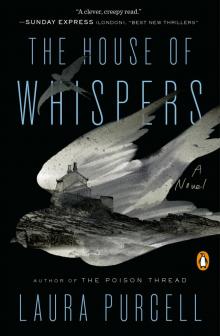 The House of Whispers
The House of Whispers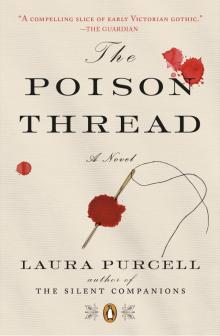 The Poison Thread
The Poison Thread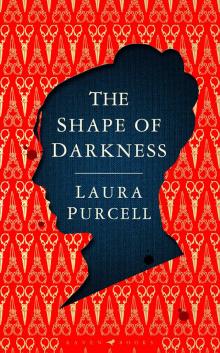 The Shape of Darkness
The Shape of Darkness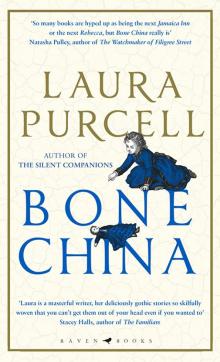 Bone China
Bone China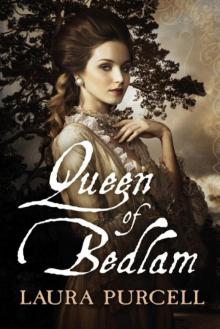 Queen of Bedlam
Queen of Bedlam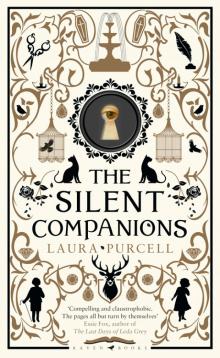 The Silent Companions
The Silent Companions